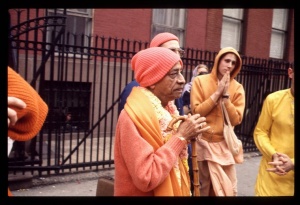CC Madhya 20.219: Difference between revisions
m (1 revision(s)) |
(Vanibot #0054 edit - transform synonyms into clickable links, which search similar occurrences) |
||
| (One intermediate revision by one other user not shown) | |||
| Line 1: | Line 1: | ||
{{ | [[Category:Sri Caitanya-caritamrta - Madhya-lila Chapter 20|C219]] | ||
<div style="float:left">'''[[Sri Caitanya-caritamrta|Śrī Caitanya-caritāmṛta]] - [[CC Madhya|Madhya-līlā]] - [[CC Madhya 20|Chapter 20: Lord Śrī Caitanya Mahāprabhu Instructs Sanātana Gosvāmī in the Science of the Absolute Truth]]'''</div> | |||
<div style="float:right">[[File:Go-previous.png|link=CC Madhya 20.218|Madhya-līlā 20.218]] '''[[CC Madhya 20.218|Madhya-līlā 20.218]] - [[CC Madhya 20.220|Madhya-līlā 20.220]]''' [[File:Go-next.png|link=CC Madhya 20.220|Madhya-līlā 20.220]]</div> | |||
{{CompareVersions|CC|Madhya 20.219|CC 1975|CC 1996}} | |||
{{RandomImage}} | |||
==== TEXT 219 ==== | ==== TEXT 219 ==== | ||
<div | <div class="verse"> | ||
sarvatra prakāśa tāṅra—bhakte sukha dite | :sarvatra prakāśa tāṅra—bhakte sukha dite | ||
jagatera adharma nāśi’ dharma sthāpite | :jagatera adharma nāśi’ dharma sthāpite | ||
</div> | </div> | ||
| Line 12: | Line 16: | ||
==== SYNONYMS ==== | ==== SYNONYMS ==== | ||
<div | <div class="synonyms"> | ||
''[//vanipedia.org/wiki/Special:VaniSearch?s=sarvatra&tab=syno_o&ds=1 sarvatra]'' — everywhere; ''[//vanipedia.org/wiki/Special:VaniSearch?s=prakāśa&tab=syno_o&ds=1 prakāśa]'' — manifestations; ''[//vanipedia.org/wiki/Special:VaniSearch?s=tāṅra&tab=syno_o&ds=1 tāṅra]'' — His; ''[//vanipedia.org/wiki/Special:VaniSearch?s=bhakte&tab=syno_o&ds=1 bhakte]'' — to the devotees; ''[//vanipedia.org/wiki/Special:VaniSearch?s=sukha&tab=syno_o&ds=1 sukha] [//vanipedia.org/wiki/Special:VaniSearch?s=dite&tab=syno_o&ds=1 dite]'' — to give happiness; ''[//vanipedia.org/wiki/Special:VaniSearch?s=jagatera&tab=syno_o&ds=1 jagatera]'' — of the material world; ''[//vanipedia.org/wiki/Special:VaniSearch?s=adharma&tab=syno_o&ds=1 adharma]'' — irreligious principles; ''[//vanipedia.org/wiki/Special:VaniSearch?s=nāśi’&tab=syno_o&ds=1 nāśi’]'' — destroying; ''[//vanipedia.org/wiki/Special:VaniSearch?s=dharma&tab=syno_o&ds=1 dharma]'' — religious principles; ''[//vanipedia.org/wiki/Special:VaniSearch?s=sthāpite&tab=syno_o&ds=1 sthāpite]'' — to establish. | |||
</div> | </div> | ||
| Line 19: | Line 23: | ||
==== TRANSLATION ==== | ==== TRANSLATION ==== | ||
<div | <div class="translation"> | ||
“The Lord is situated in all the universes in different forms just to please His devotees. Thus the Lord destroys irreligious principles and establishes religious principles. | “The Lord is situated in all the universes in different forms just to please His devotees. Thus the Lord destroys irreligious principles and establishes religious principles. | ||
</div> | </div> | ||
| Line 26: | Line 30: | ||
==== PURPORT ==== | ==== PURPORT ==== | ||
<div | <div class="purport"> | ||
In the material world, the Lord is situated in different arcā-mūrtis (Deities) in the temples just to decrease the material activities of the conditioned soul and increase his spiritual activities. Particularly in India there are many temples throughout the country. Devotees may take advantage of them and go see the Lord at Jagannātha Purī, Vṛndāvana, Prayāga, Mathurā, Hardwar and Viṣṇu-kāñcī. When the devotees travel to these places and see the Lord, they become very happy in devotional service. | In the material world, the Lord is situated in different ''arcā-mūrtis'' (Deities) in the temples just to decrease the material activities of the conditioned soul and increase his spiritual activities. Particularly in India there are many temples throughout the country. Devotees may take advantage of them and go see the Lord at Jagannātha Purī, Vṛndāvana, Prayāga, Mathurā, Hardwar and Viṣṇu-kāñcī. When the devotees travel to these places and see the Lord, they become very happy in devotional service. | ||
</div> | </div> | ||
__NOTOC__ | |||
<div style="float:right; clear:both;">[[File:Go-previous.png|link=CC Madhya 20.218|Madhya-līlā 20.218]] '''[[CC Madhya 20.218|Madhya-līlā 20.218]] - [[CC Madhya 20.220|Madhya-līlā 20.220]]''' [[File:Go-next.png|link=CC Madhya 20.220|Madhya-līlā 20.220]]</div> | |||
__NOTOC__ | |||
__NOEDITSECTION__ | |||
Latest revision as of 22:39, 19 February 2024

A.C. Bhaktivedanta Swami Prabhupada
TEXT 219
- sarvatra prakāśa tāṅra—bhakte sukha dite
- jagatera adharma nāśi’ dharma sthāpite
SYNONYMS
sarvatra — everywhere; prakāśa — manifestations; tāṅra — His; bhakte — to the devotees; sukha dite — to give happiness; jagatera — of the material world; adharma — irreligious principles; nāśi’ — destroying; dharma — religious principles; sthāpite — to establish.
TRANSLATION
“The Lord is situated in all the universes in different forms just to please His devotees. Thus the Lord destroys irreligious principles and establishes religious principles.
PURPORT
In the material world, the Lord is situated in different arcā-mūrtis (Deities) in the temples just to decrease the material activities of the conditioned soul and increase his spiritual activities. Particularly in India there are many temples throughout the country. Devotees may take advantage of them and go see the Lord at Jagannātha Purī, Vṛndāvana, Prayāga, Mathurā, Hardwar and Viṣṇu-kāñcī. When the devotees travel to these places and see the Lord, they become very happy in devotional service.